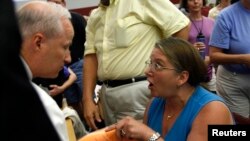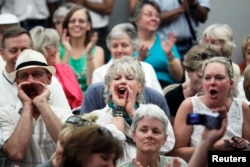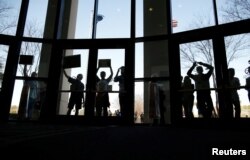It was one of the most exclusive tickets in town: Only 800 were made available, and those lucky enough to score one were told they would have to show photo ID at the gate, where they would be issued a wristband and a number. No signs bigger than a sheet of notebook paper allowed, so as not to obscure anyone's view.
The rules weren't for a rock concert but for a town hall meeting Wednesday evening between Republican Rep. Mike Coffman and his suburban Denver constituents.
Town halls have become a risky proposition for GOP members of Congress since President Donald Trump's election. Liberal groups and constituents angry about the Trump agenda have flooded public meetings, asking their representatives tough questions, chanting, heckling them and even shouting them down in skirmishes that have made for embarrassing online video.
On Monday, for example, South Carolina Rep. Joe Wilson, who became infamous for yelling "You lie!" at President Barack Obama during a speech to Congress in 2009, was himself confronted at a town hall by constituents chanting, "You lie!"
As a result, some Republicans aren't holding town halls. And some of those who are going ahead with such events are taking steps to keep things from getting out of control.
In Texas, Rep. John Culberson barred signs and noisemakers from a March 24 town hall, required those attending to prove they were constituents by showing utility bills or other documents, and insisted that questions be submitted in advance. He was still shouted down repeatedly by a crowd angry about the GOP push to repeal the Affordable Care Act.
In Arkansas, Rep. French Hill will hold his first town hall of the year on Monday — but in the middle of the afternoon, and with the state's Republican junior senator, Tom Cotton, at his side. Nevada's Dean Heller, one of the more vulnerable GOP senators in 2018, will also hold his first town hall of 2017 on Monday, in the morning. And he, too, is apparently seeking safety in numbers by including Republican Rep. Mark Amodei.
Democrats, for their part, have felt the heat from anti-Trump constituents at town halls and are also taking precautions. Democratic Sen. Kamala Harris of California, for example, is banning signs at her town hall in Los Angeles next week.
Coffman is a politician perennially in the hot seat. His swing district has slightly more Democrats than Republicans, and he is always a top target in elections. For years, he has avoided town halls, instead holding private, one-on-one meetings with constituents during "office hours" at libraries in his district.
In January, one of those events was flooded by hundreds of constituents and activists who filled the library lobby, sang, chanted and demanded Coffman emerge from his private conversations to address them. The congressman ended up slipping out the back.
One of the rules for his Wednesday town hall was no standing in the aisles or blocking entrances and exits.
Coffman's spokesman, Daniel Bucheli, said the congressman decided to hold the event because he knows constituents are anxious. Coffman has said his office spent weeks trying to find as large a venue as possible before securing a hall at a satellite branch of the University of Colorado that could hold 600 people and an overflow room to accommodate 200 more.
"Because of the big demand and a lot of people wanting questions answered, this was a great forum," Bucheli said.
Smadar Belkind Gerson, an activist in Coffman's district who was helping to organize protests outside the town hall, said that she was glad Coffman moved to a more open format but that he has a long way to go. The event, she noted, was scheduled to last only an hour, and Coffman's staff planned to draw numbers to determine which constituent could ask questions.
"Yes, people are upset," Gerson said. "But the more you do this and the more you restrict people, the more they will be upset."
She noted that a Democratic state lawmaker who may challenge Coffman in 2018 planned to hold a town hall on the same campus Wednesday evening with no restrictions on attendance or questions.
Coffman held two town halls via telephone before Wednesday's in-person event. Those appearances are far more controlled, with questions submitted in advance and an operator cutting off the questioner so the politician can respond.






